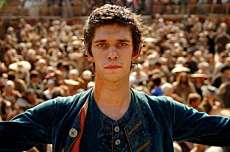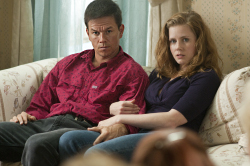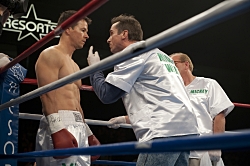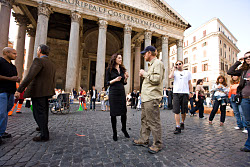Interview with Ben Whishaw (Grenouille)
Ben Whishaw’s Interview (Grenouille)
 Tom Tykwer’s Interview (Director)
Tom Tykwer’s Interview (Director)
Popular on LondonNet
 RADA trained Ben Whishaw has steadily been making his name on the stage, at the National Theatre in His Dark Materials and at The Old Vic playing Hamlet. It was during this run that Tom Tykwer saw him and resolved to cast him as Jean-Baptiste Grenouille, the anti hero of Perfume: The Story of A Murderer. Whishaw’s other film credits include The Trench, My Brother Tom, Layer Cake and Stoned.
RADA trained Ben Whishaw has steadily been making his name on the stage, at the National Theatre in His Dark Materials and at The Old Vic playing Hamlet. It was during this run that Tom Tykwer saw him and resolved to cast him as Jean-Baptiste Grenouille, the anti hero of Perfume: The Story of A Murderer. Whishaw’s other film credits include The Trench, My Brother Tom, Layer Cake and Stoned.
Did you know Patrick Suskind’s book going into this film?
I knew it but I hadn’t read it. Obviously I’ve read it many times now, but when I auditioned for the film I only knew of it, I hadn’t read the whole thing.
Is it daunting for an actor to have to convey such nuance and subtlety as you do with Grenouille?
Yeah it was, but that was part of the appeal of it I suppose. And the fact that he’s not like anyone I’ve seen before. It just became a question of trying to find a way of making the character expressive and accessible to people through his physicality, what was going on in his face, that kind of thing. Which is not something that’s easy to direct really, it’s harder to reach those goals.
You certainly don’t have a huge amount of lines, Grenouille is not the most verbal of characters is he?
It’s difficult, it’s a bit like acting in a silent movie. That’s what Dustin Hoffman said to me, anyway. We did the scenes with him in the first two weeks, and as he was leaving he said ‘well now you’re making a silent film Ben, good luck!’.
Your nose is a crucial organ in the scheme of things, was that taken into consideration during your audition?
I was thinking about this the other day, it must have been quite important but I didn’t think about it at the time. His nose is described in the book, though not in immense detail. There’s not an awful lot you can say about a nose, it’s not the most expressive feature on a face.
Do these particular challenges make it more akin to something you do in the theatre then?
I think they do, because of this emphasis on physicality. There had to be a physical presence communicating something, so in that sense it was helpful to have done so much theatre work I think.
How did you develop that physicality, for instance the very particular, animalistic quality of his movements?
We didn’t ever fix anything, it was just something that evolved. It was a mixture of what the costumes did to my body, naturally. We did look at animals, and that must have fed into it in some way. And again, just taking in what was around me, the filth and poverty and that tannery set all kind of contributed somehow.
 How long did it take to have your make up applied in the mornings?
How long did it take to have your make up applied in the mornings?
It was a good hour and a half. At least I think we got it down to that, eventually. More than anything it was being covered from head to toe in filth, that’s what took ages. And even with the few scars I had, getting them in exactly the same positions every day was quite time consuming.
Did all that make this an uncomfortable role to play?
It was quite grim, but for me that’s part of the fun of it. I love that. In the theatre everything’s imagined but on the set it was all totally real. So the mud and the filth was there and tangible. That was a riot for me, you can let your imagination run totally free because everything’s feeding you. That was a totally joyful thing.
How did the set itself smell?
It certainly didn’t smell as bad as it looked, although the fish market was fairly diabolical. That was totally authentic. But on the whole it wasn’t as repulsive as it appeared, particularly in those early scenes.
There’s a scene towards the end of the where Grenouille’s powers are unleashed and a crowd slavering for his blood are transformed into one giant orgy. And you are a witness to it. Is this the kind of scene where you reflect upon what a curious job you have?
It’s interesting how quickly that kind of thing becomes normal. At first you don’t know where to look, I found my eyes resting in the most inappropriate areas. But the extras were so up for it, they were really great. They work with this theatre company out in Spain, so those scenes were quite carefully choreographed. That’s one of the great things about it, it doesn’t feel like a load of extras, it feels like they’re really contributing something essential to the drama. But it was certainly unusual.
In the way that Grenouille has manipulated the crowd, is there parallel between that and being an actor on the stage?
I think so, definitely. That’s one of the interesting things about this character, he does represent something about actors and what makes actors act, what makes people crave fame, people like rock stars and that kind of thing. In the power of that position, and the adoration, there’s definitely a parallel. We talked a lot about him being a Michael Jackson type figure, somebody who is driven by some very deep feeling of loneliness. And for Grenouille the only thing that can mitigate it is total, absolute adoration. He goes to an extreme place of love and it overwhelms him.
He is, though, totally amoral, isn’t he?
He is, but that’s why I think he’s an interesting character. I don’t even think of him being evil or immoral, there’s just a complete lack of any moral thinking at all. He’s just so completely disconnected from those laws that govern society and social interaction. He’s completely isolated from them.
This fatal flaw in his make up is linked, in a way, to his discovery that – while he can discern any smell – he has no scent of his own, isn’t it?
That’s very true. The crisis and the turning point for him is that moment when he realises that he doesn’t smell. I was always unsure whether in reality he doesn’t have a smell, or whether it’s in his head that he doesn’t have a smell. But either way it brings about this existential crisis, what am I if I don’t smell of anything? It’s all to do with his identity.
You seem to have a taste for characters who are at some sort of existential crossroads, whether it be Hamlet, Grenouille or Sidney in Layer Cake. Do you see that thread in your work?
I think they’re all characters struggling with their own weakness in some way. I’ve seen that a lot as a theme through the characters I’ve played. They’re fighting these internal struggles, and I think that’s true of Grenouille as well.
So is this like a form of therapy, dealing with these issues through your work so that you don’t have to face them in your own life?
I’m sure there is an element of that, I think there is something cathartic about acting. And for me there always has to be a personal connection, you always look for an area where you and the character meet, where the two cross in some way because that’s the way you find something authentic and real.
 Has Perfume opened anywhere yet?
Has Perfume opened anywhere yet?
It’s opened in Germany and in the German speaking territories and in France and Italy and Russia.
And how has it been received?
It seems to have been a real success. I’ve been to the openings out there, audiences are certainly going to see it.
Is it odd seeing yourself dubbed into a foreign language?
I couldn’t do that, I couldn’t watch it, it would have been too bizarre. We had the premiere in Munich and that version of it was dubbed. I thought this wasn’t the right time to see it, this thing that I’d been working on for two years. I thought I’d wait until I could see it in English.
What’s next for you?
I’ve just finished a film about Bob Dylan called I’m Not There. Dylan is played by six different people, one of them is Cate Blanchett and one of them is a 12 year old black kid, and another is me. The others are Richard Gere, Heath Ledger and Christian Bale. It’s not at all conventional or a straightforward, naturalistic biopic. It’s much more expressionistic and I think Todd Haynes the director is interested in exploring the different faces of this man who seems to reinvent himself every time he comes back into the public sphere. He’s always somebody different.
As to your future, are you likely to be working more in movies now rather than theatre?
I doubt it, I love the stage too much. Now I actually see far more films than I do theatre, but it’s the place where I think you really learn the most. So many of these great actors constantly dip back into it, even if they primarily concentrate on film. It’s a real testing ground for an actor, I hope I never leave it behind.







